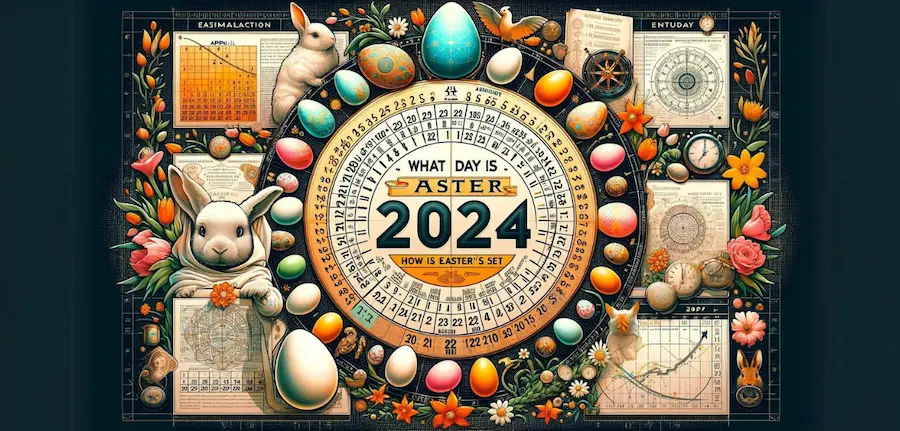Easter is an important holiday in the Christian faith, commemorating the resurrection of Jesus Christ, as described in the New Testament of the Bible. It falls on the first Sunday after the first full moon following the vernal equinox, which can be any time between March 22 and April 25.
How do we figure out when Easter is each year? It’s set for Sunday right after the first full moon that comes after the vernal equinox. This equinox marks the start of spring in the northern hemisphere.
What Day is Easter 2024?
It was set up by the Council of Nicaea in 325 AD. In 2024, Easter will be on Sunday, March 31.
Easter has a lot of cultural significance too. It’s linked with various traditions like Easter eggs and the Easter Bunny, which are a big part of the holiday’s celebration in many parts of the world. These customs mix religious and secular elements, showing the diverse cultural and religious history that Easter has.
When Is Easter 2024 & Upcoming Years?
For the year 2024, Easter Sunday in the Gregorian calendar falls on March 31. In the Eastern Orthodox Church, which uses the Julian calendar, Easter Sunday is observed on May 5, when converted to the Gregorian calendar
| Year | Easter Sunday (Gregorian calendar) | Eastern Orthodox Church (Julian calendar date converted to Gregorian) |
| 2024 | March 31 | May 05 |
| 2025 | April 20 | April 20 |
| 2026 | April 05 | April 12 |
| 2027 | March 28 | May 02 |
| 2028 | April 16 | April 16 |
| 2029 | April 01 | April 08 |
| 2030 | April 21 | April 28 |
How do we figure out Easter’s date?
It’s always on the first Sunday after the Paschal Full Moon. That’s the first full moon that happens on or after March 21, which the Church always uses as the date for the spring equinox. This might be different from the actual astronomical equinox, but it keeps things simpler.
Easter’s timing is different from Christmas, which is set on the solar calendar. Easter is based on the lunar cycles used in the Jewish calendar. This is because the Last Supper, which was the final meal Jesus had before his crucifixion, was a Passover feast. Since a lunar month is about 29.5 days, Easter’s date changes every year.
Easter story
The Easter story is really important in Christianity. The Easter story goes like this: On the first Easter morning, three days after Jesus died, his followers found that the big stone blocking his tomb was moved and the tomb was empty. In the Gospel of John, Mary Magdalene sees Jesus near the tomb but thinks he’s a gardener at first. When she realizes it’s Jesus, alive again just as he said he would be, she rushes to tell his disciples.
This story is about Jesus rising from the dead, fulfilling the prophecy that said he would be crucified and then come back to life three days later. This story is all about hope, getting a second chance, and beating death. Easter is also connected to the Jewish holiday of Passover.
Here’s the short version:
Before Easter:
- Jesus spreads his message about love, forgiveness, and God’s kingdom. He gets followers and does miracles.
- Jesus comes into Jerusalem on a donkey, just like an old prophecy said. People are super excited to see him.
- At the Last Supper, Jesus has one more meal with his friends and starts the tradition of communion.
- One of Jesus’ own guys, Judas, turns him over to the authorities, leading to Jesus’ arrest.
- Jesus goes through a rigged trial and gets sentenced to die on a cross. He’s forced to carry his cross and then nailed to it.
Easter Sunday:
- Some women, including Mary Magdalene, go to put oils on Jesus’ body, but they find his tomb empty. An angel tells them Jesus is alive again.
- Jesus shows up to his followers over the next 40 days, proving he’s really back and giving them advice and comfort.
- After 40 days, Jesus goes up to heaven, saying he’ll come back someday.
What this all means:
- Jesus beating death is like a big win over death and bad stuff, giving people hope for life after death.
- Jesus dying is seen as him showing ultimate love, paying the price for human mistakes, and offering forgiveness.
- Jesus coming back to life is like a fresh start for how people and God get along, focusing on love and kindness.
That’s the short of it. The Easter story is super detailed and meaningful. You can find more in the four Gospels in the Bible, and people celebrate it in different ways all over the world.
Is Easter Sunday a Public Holiday?
Is Easter Sunday a day off? No, it’s not a public holiday. In 2024, it’s on Sunday, March 31, and in the United States, most places will be open like they usually are on Sundays.
How is Easter Celebrated?

Easter is a special holiday for Christians. It’s about celebrating Jesus Christ coming back to life three days after he was crucified. People started celebrating Easter way back in the 2nd century, and it might have even started earlier than that. The name “Easter” and where it comes from is kind of a mystery. It’s like the German word “Ostern.”
All over the world – in Africa, Asia, Europe, and the Americas – people go to church to celebrate Easter. Families have fun traditions like painting Easter eggs, looking for hidden eggs, enjoying chocolate eggs and bunnies, and having a special Easter meal.
The way we celebrate Easter today mixes Christian beliefs with old-timey pagan celebrations. One of the most famous things about Easter is the Easter egg. This tradition goes all the way back to ancient Babylon. Another symbol of Easter is the Easter lily. It’s a sign of resurrection in Western Christianity, and you’ll see it a lot in churches during Easter and the following weeks.
Summery
Easter is a meaningful holiday that blends deep-rooted traditions with Christian faith, symbolizing a story of hope, rebirth, and renewal. It’s not just a religious observance but also a time for families and communities to come together, embracing customs that have evolved over centuries. From the ancient symbolism of Easter eggs to the spiritual significance of the Easter lily, this holiday carries a rich tapestry of cultural and religious significance, celebrated across the globe. It’s a time to reflect on new beginnings and the enduring message of resurrection and redemption.




